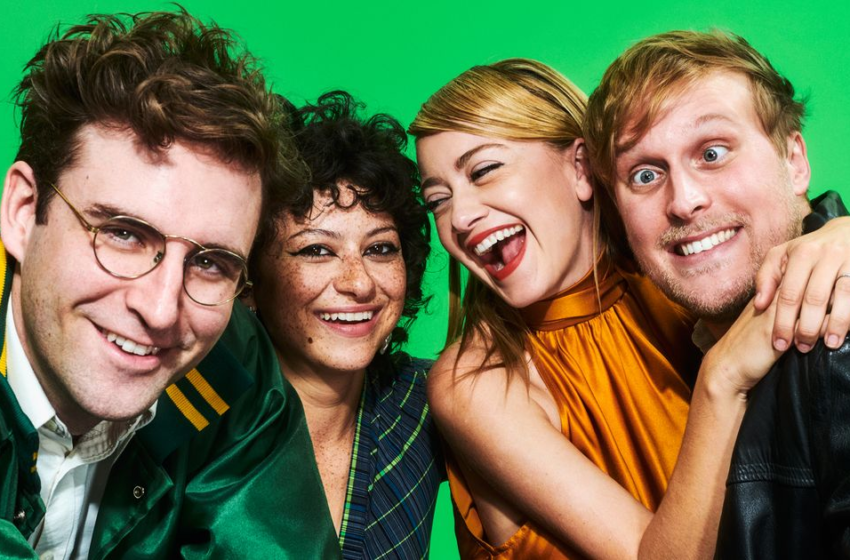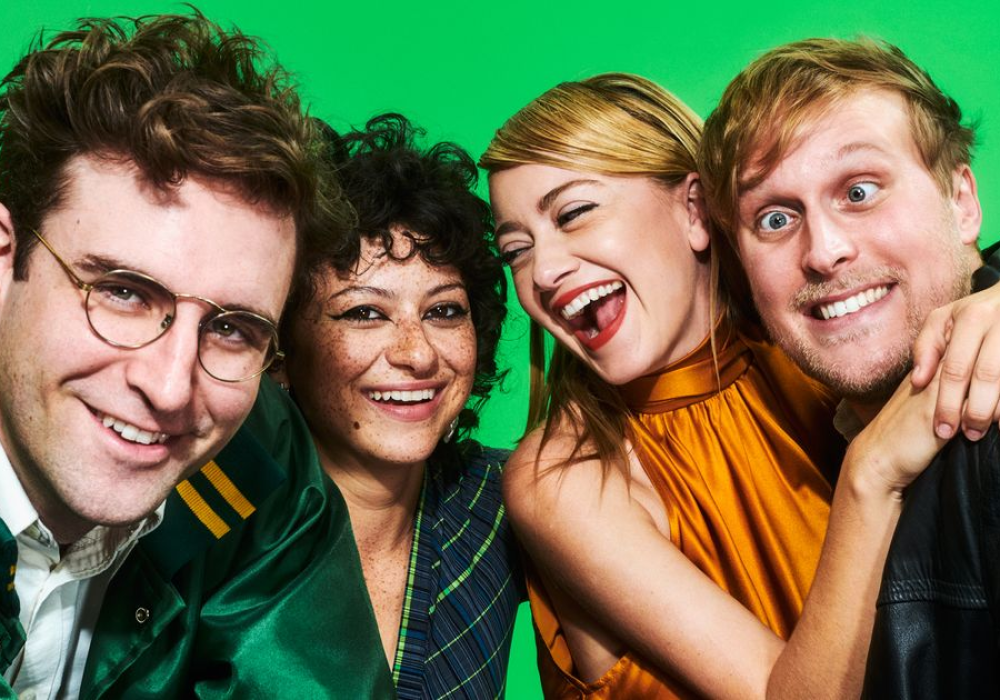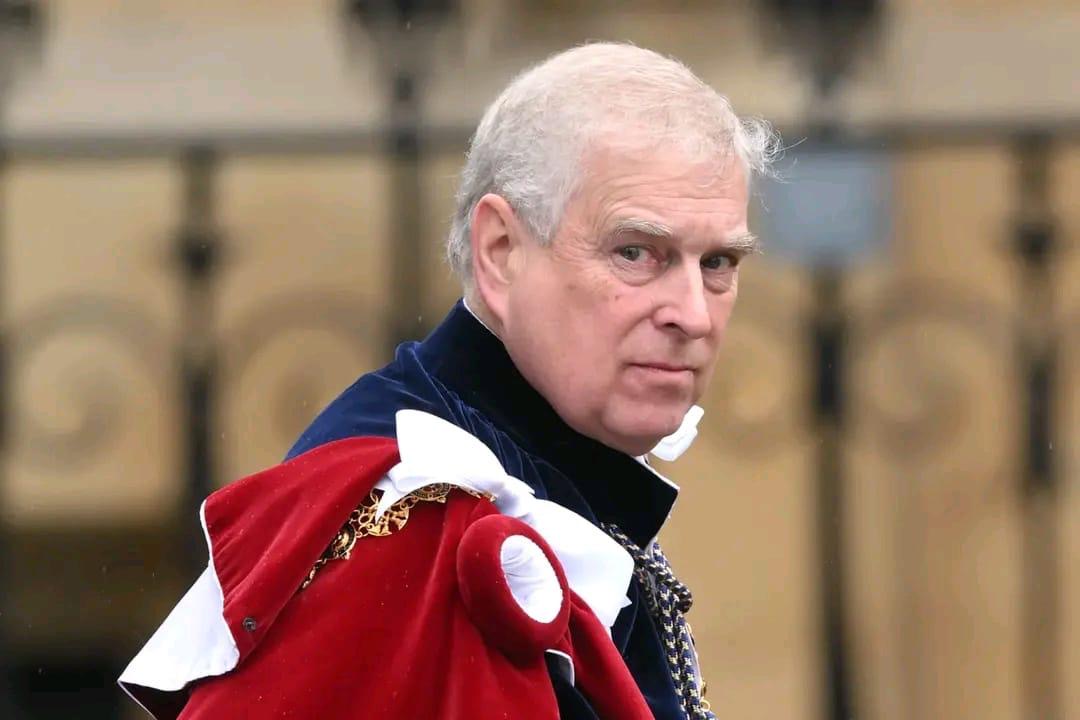
This article was featured in One Great Story, New York’s reading recommendation newsletter. Sign up here to get it nightly.
It’s a sweltering July afternoon at the Brooklyn Navy Yard, where one of those uncomfortably combative news talk shows is being taped. The sort in which the host grills the guests until everyone is yelling at one another. And the guests are there to sell us, the audience, on some wildly unrealistic product that has just hit its billion-dollar valuation. On sale today: enlightenment, which is being peddled by a peaceful brunette millennial in a billowing white robe and the flamboyant gold-suit-wearing tech entrepreneur funding her.
It’s theater of the absurd, and no one does it better than the cast and crew of Search Party, which debuts its fifth and final season on Friday.
When Search Party originally premiered on TBS in November 2016 (it moved to HBO Max in 2018), it was initially marketed as a broad comedy about millennial ennui, opening with its core four — Dory (Alia Shawkat); her on-and-off boyfriend, Drew (John Reynolds); flighty actress Portia (Meredith Hagner), and loose cannon Elliott (John Early) — at (where else?) brunch. Instead, Dory’s obsession with their college classmate’s sudden disappearance served as a totally random gateway into murder, kidnapping, and court cases alongside wacky send-ups of pop culture. In its penultimate season, after Dory was kidnapped by her obsessed fan, Chip (Cole Escola), he traps her in a terrifying felt-lined replica of her Williamsburg apartment. It premiered last January, after we had all been homebound for nearly a year, and Dory’s entrapment never felt timelier. That’s the thing that has kept Search Party surprising — and maybe why it received constant critical acclaim and gathered a cult following — it somehow knows what’s going to happen next.
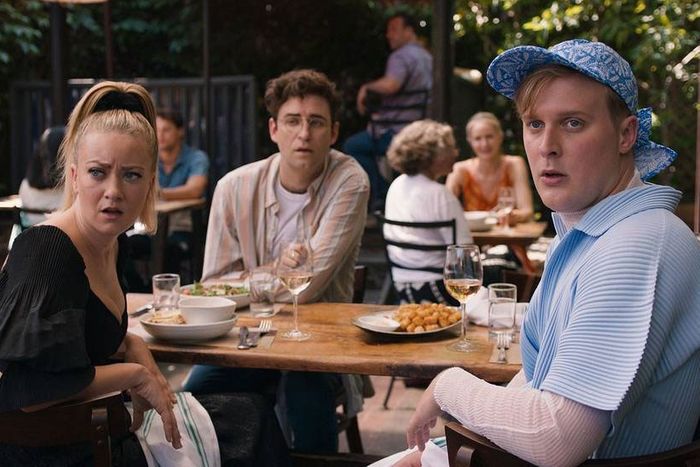
Photo: Courtesy of HBO Max
It’s a quality that keeps the cast in awe too. “I always trip out on them,” Shawkat says of creators Charles Rogers and Sarah-Violet Bliss. We’re chatting over Zoom a few months after my visit to that Brooklyn Navy Yard set; Shawkat is at home in Los Angeles, her parents’ dogs barking wildly in the background. “I’m like, What are you guys doing?” she continues. “They have a way of making sense of, like, what is the extreme version if Dory were real, you know? And if these people were real? What is the extreme version of this environment?” For Rogers and Bliss, they accidentally created a coming-of-age show. “We’ve treated the whole series accidentally as a metaphor for growing up,” Rogers says. “In season five, everyone’s in some actualized form of themselves. We wanted to find every character’s adult version of themselves and then try to say something interesting about what is broken about all the ways you can be an adult.”
While the show has kept Dory & Co. constantly evolving and changing, Search Party itself could have easily relied on the formula that made season one a critical darling: comedy and mystery with Nancy Drew–esque marketing. Instead, each season has mashed genres together in a way that has kept audiences guessing and provided ample fodder for the actors to explore their characters through noir, horror, and true crime. “I’ll do one scene where I feel like I’m in a screwball comedy from the ’30s,” Hagner tells me over Zoom from her bright, sunny kitchen. “And then the next scene, I’m, like, in what feels like, tonally, The Handmaid’s Tale — I get to go to these places, or I get to play with tone and performance in a way that’s the kind of freedom that you would feel in an acting class.”
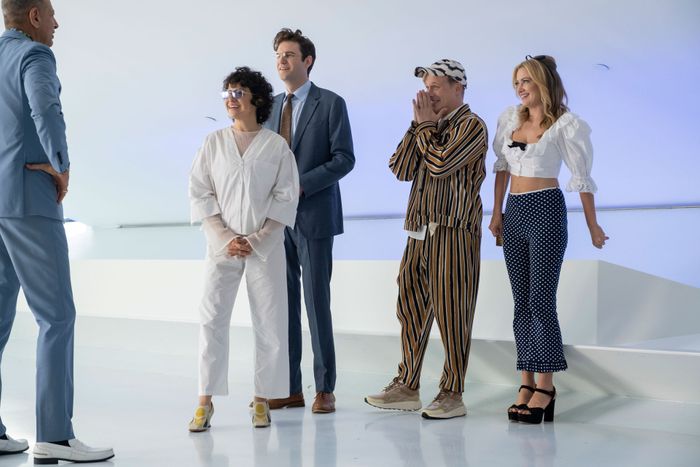
Photo: Jon Pack/HBOMax
Back on set, creators Rogers and Bliss pensively watch the scene being shot, making notes and chatting with the cast between takes. In season five, Dory has started a cult, funded by tech billionaire Tunnel Quinn, played by Jeff Goldblum, and the two are being interviewed by the news host (played by character actor Damian Young) about their latest enlightenment endeavor. When Young dryly flubs a question asking about Dory’s new venture, everyone behind the camera giggles as they cut. It gives an initial taste of the relationship between Dory’s zen attitude partnered up against Tunnel’s salesperson presence.
It’s a scene that encapsulated many of the themes that the final season explores — social media, wellness, power fueled by capitalism and how all three intersect. “Once you start going down the wormhole of spiritual leaders — there’s so many, and they all have Instagram,” Bliss says. “There is a promotional aspect to whatever it is that they’re spreading. How do they navigate this world that is egotistical when their whole message is egolessness?”
While Dory’s message might be based in something resembling good faith, her backer Tunnel’s seems to be more based in money. “They’ve described my character as an Elon Musk or Richard Branson,” Goldblum says, chuckling, barely breaking character when we chat in the greenroom after they finish shooting. “I like it because his character is full of surprises — I dress very over the top, but he’s also a very effective salesperson.” It’s another thing that echoes a bit too closely to real life: You can’t exactly avoid the 2021 Time Person of the Year’s tweets even if you try. (The casting of Goldblum, an acting legend, might be a little too perfect.) Goldblum wasn’t initially familiar with the show, but after bingeing the four seasons, it was a no-brainer for him: “What I love about the whole show is it’s spectacularly, psychologically pyrotechnic.”
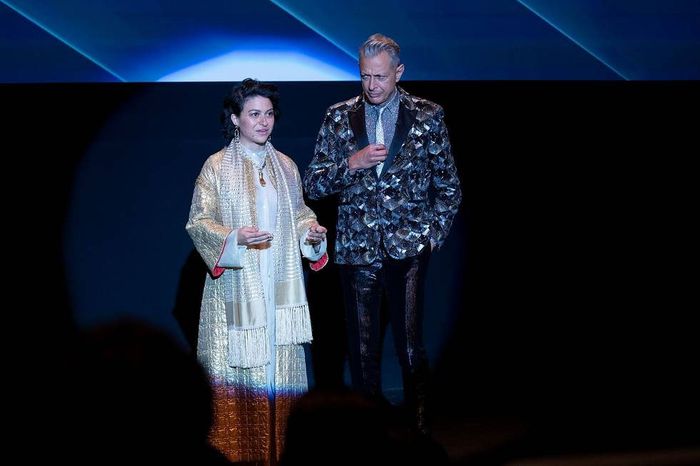
Photo: Jon Pack/HBO Max
Dory’s new branding as a spiritual guru, one who leads her friends along with her, echoes back to the core of the show: Dory gets involved in something, and her friends follow her along the way. But as Early notes, it’s the first time it feels like Dory isn’t blindly stringing them along. “What’s interesting about this season is that Dory, for the first time, actually has some wisdom,” he says matter-of-factly while clutching a comically large water bottle. “In the way that Marianne Williamson was, at the end of the day, a very compelling presidential candidate. That’s what is going to make this season compelling and not just a parody of our cult obsession.”
And while the characters will be navigating Dory’s cult and whether or not they can trust Tunnel, like Rogers and Bliss mentioned, they are also exploring “broken adult stuff,” like complicated love triangles, adopting children, and utter mayhem. But that’s the thing about Search Party: Even when the characters change and evolve, they always return to some of their same patterns. “What’s really refreshing is that Elliott doesn’t evolve,” Early says. “That’s probably more true to life about the way people really are. Who wants to see Elliott become a good person? You don’t want to see the women of Absolutely Fabulous suddenly know they are craven materialists — you tune in to see them get tanked and trip and fall on their faces.”
And Early is right: You don’t want to see them change. Perhaps, yes, you want to see them happy or end things on a note that feels correct for them. But it’s a show that has gone through a fictionalized version of much of what has happened to its viewership (who are likely in the same age range) over the past five seasons — much of which hasn’t been great. It wouldn’t feel real or true to what Rogers and Bliss have explored with these characters if it were simple and neatly tied up.
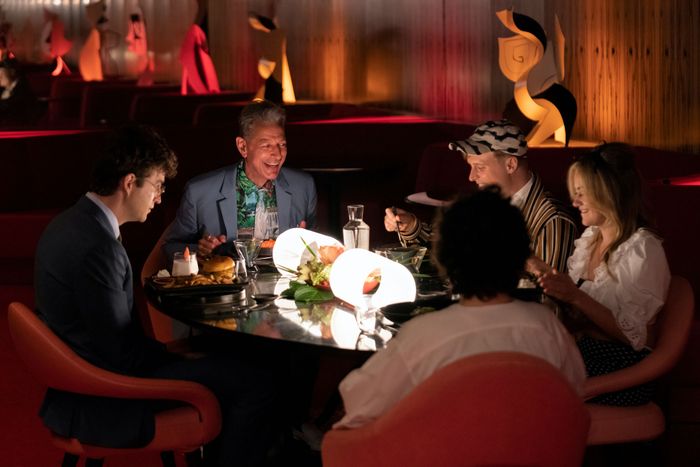
Photo: Jon Pack/Netflix
Ultimately, the cast is happy with how the series concludes. Hagner tells me it all ends on a poetic and beautiful note, and, even better, the last shot of the series lined up with the last day of shooting. “Everyone cried,” she says.
As the heart of the show, Shawkat thinks audiences will be happy too — and not just the millennials. “It’s a timeless and beautiful story,” she tells me. “It’ll always hold because the search for yourself when you’re young and thinking that you deserve more — it’s a really powerful story. When I read the last scene of the finale, it really hit me hard where I was like, Oh yeah, it’s just the same story, just told on a different scale. It should feel really satisfying in that kind of way where you’re like, Oh, nothing’s really changed, has it?”

